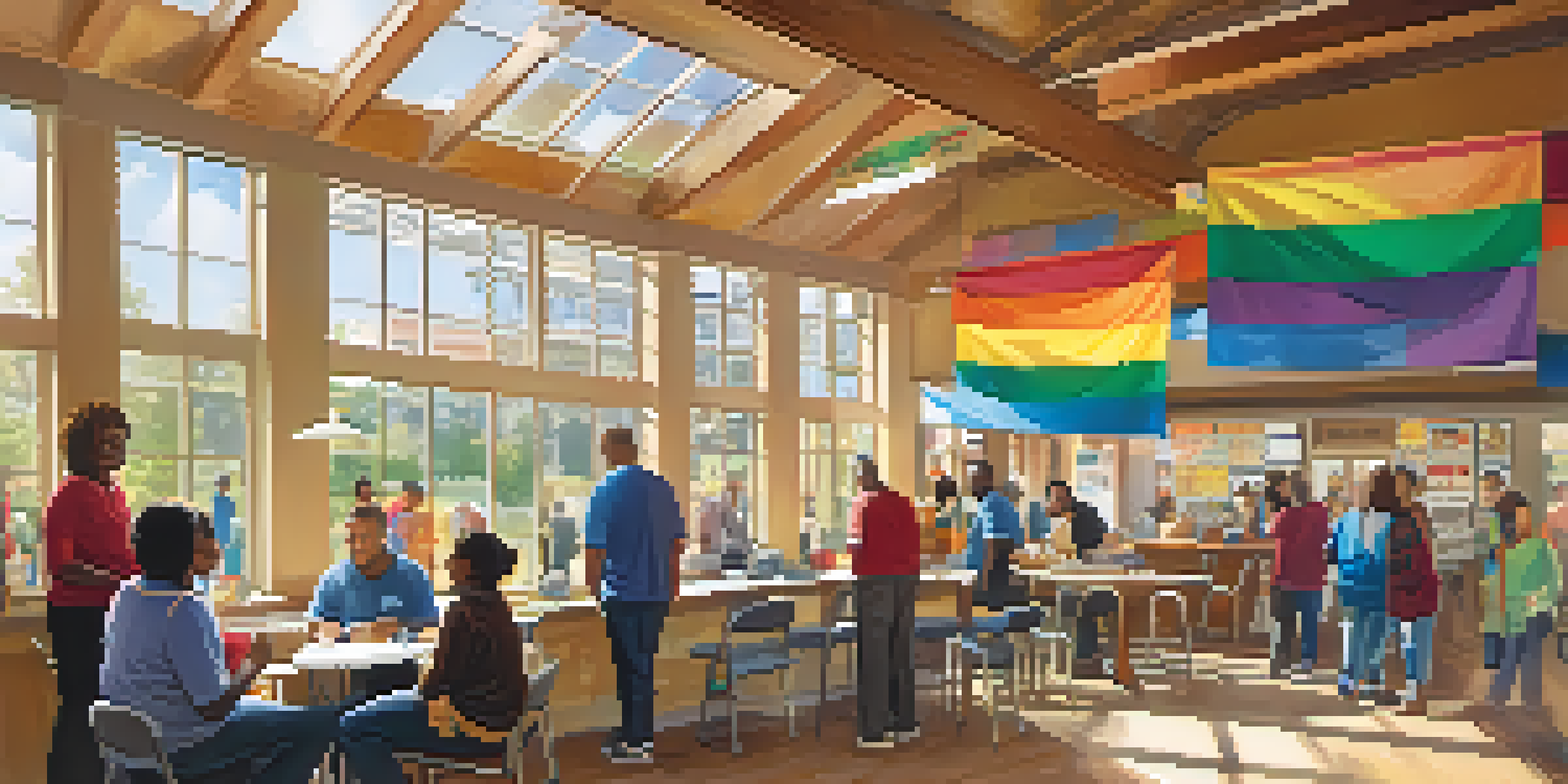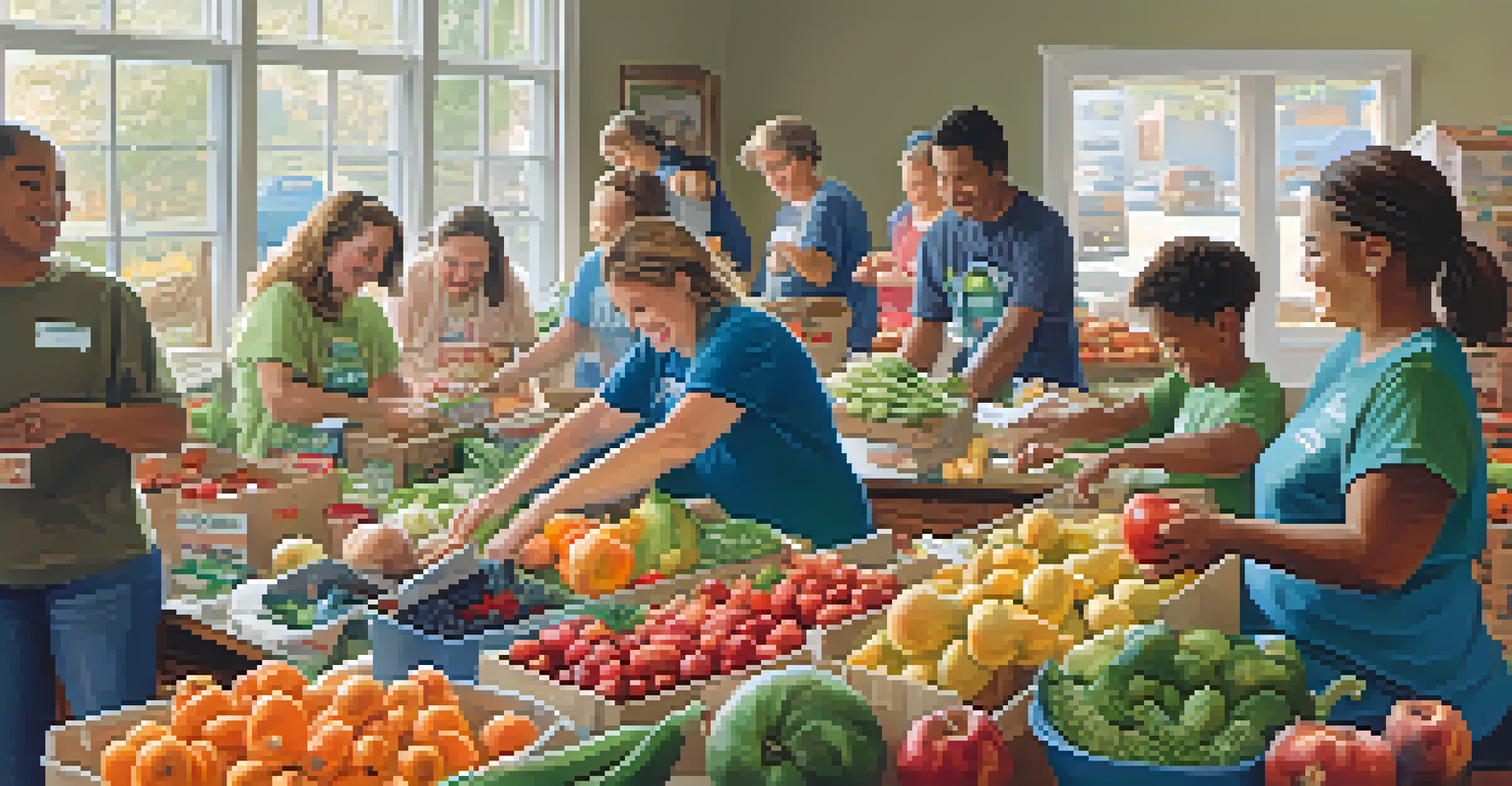Rochester's Outreach Programs: Bridging Gaps in Social Services

Introduction to Rochester's Outreach Programs
Rochester's outreach programs are crucial in addressing social service gaps within the community. They serve as a bridge, connecting individuals and families with the resources they need for better quality of life. Through various initiatives, these programs aim to foster equity and inclusion for all residents, regardless of their backgrounds.
The best way to find yourself is to lose yourself in the service of others.
These outreach efforts often involve collaboration among local organizations, government agencies, and volunteers. By pooling resources and expertise, they can effectively tackle complex social issues such as homelessness, food insecurity, and mental health challenges. This collaborative approach not only maximizes impact but also strengthens community bonds.
As we delve deeper into the specific programs available, it becomes evident that their impact extends beyond immediate assistance. They empower individuals to regain control over their lives and improve their circumstances, ultimately fostering a stronger, more resilient Rochester.
Key Outreach Programs in Rochester
One of the standout outreach programs in Rochester is the Community Resource Center, which provides a variety of services, from job training to healthcare access. This center acts as a one-stop shop for individuals seeking support, guiding them through the often overwhelming landscape of social services. By simplifying access to these resources, the center helps reduce barriers that many face.

Another notable initiative is the Food Security Program, which addresses hunger issues by providing nutritious meals and groceries to those in need. This program not only meets immediate food needs but also educates participants on healthy eating and budgeting. By promoting self-sufficiency, it helps families build a foundation for long-term well-being.
Community Collaboration Drives Impact
Rochester's outreach programs thrive through partnerships among local organizations and volunteers, maximizing their effectiveness in addressing social issues.
Additionally, the Mental Health Outreach Program offers vital support for individuals struggling with mental health issues. Through counseling services, support groups, and community workshops, it aims to destigmatize mental health conversations. By prioritizing mental well-being, Rochester's outreach efforts contribute to a healthier, more supportive community.
Collaboration with Local Organizations
Collaboration is at the heart of Rochester's outreach programs, allowing them to leverage the strengths of various local organizations. By working together, these groups can share resources, knowledge, and best practices to enhance their collective impact. This team-oriented approach creates a more cohesive network of support for community members.
Volunteers do not necessarily have the time; they just have the heart.
For example, partnerships with schools enable outreach programs to address children's needs more effectively. By integrating services such as tutoring and mental health support within educational settings, these programs can reach families where they are most comfortable. This targeted approach ensures that no child falls through the cracks.
Moreover, local businesses often contribute by sponsoring events or providing job opportunities for program participants. This collaboration not only benefits the individuals involved but also strengthens the local economy. When businesses invest in their communities, everyone ultimately reaps the rewards.
The Role of Volunteers in Outreach Efforts
Volunteers play a vital role in the success of Rochester's outreach programs. Their passion and dedication often fill the gaps left by limited funding and staffing. From organizing food drives to providing mentorship, volunteers bring a personal touch that enhances the overall effectiveness of these initiatives.
Many volunteers share personal stories that inspire others to get involved. For instance, someone who once benefited from a program might return to offer their time and expertise. This cycle of giving back not only strengthens the community but also fosters a sense of belonging among participants and volunteers alike.
Empowering Lives Through Outreach
Success stories from Rochester highlight how outreach initiatives provide essential support, enabling individuals and families to overcome obstacles and achieve stability.
Training and support for volunteers are essential to ensure they feel equipped to help others. By providing resources and guidance, outreach programs can maximize the impact of their volunteer workforce. In turn, this creates a more robust support system for those in need.
Success Stories: Impact of Outreach Programs
Success stories abound in Rochester, showcasing the profound impact of outreach programs on individuals and families. Take, for example, a family that found themselves facing eviction. Through the assistance of the Community Resource Center, they received legal aid and were able to secure stable housing. This not only changed their immediate circumstances but also set them on a path toward financial stability.
Another inspiring story involves a young adult who participated in job training through the Food Security Program. After acquiring skills and securing employment, they were able to support themselves and contribute positively to their community. Such transformations highlight the ripple effect that outreach programs can have on the broader Rochester community.
These narratives serve as a reminder that outreach programs are more than just services; they are lifelines that empower individuals to overcome obstacles. By sharing these success stories, Rochester's outreach initiatives inspire hope and encourage others to seek the assistance they need.
Challenges Faced by Outreach Programs
Despite their successes, outreach programs in Rochester face several challenges. Limited funding can restrict the scope of services offered, making it difficult to meet the growing demand for assistance. As the population continues to grow, the need for these critical services becomes even more pressing.
Additionally, outreach programs often grapple with awareness and accessibility issues. Many residents may not know what services are available or feel intimidated by the process of seeking help. Overcoming these barriers is essential to ensure that those in need can access the tools and support necessary for their well-being.
Challenges Limit Outreach Potential
Despite their successes, outreach programs in Rochester face funding constraints and awareness issues that hinder their ability to serve the growing community effectively.
Furthermore, maintaining volunteer engagement can be challenging, especially during periods of economic uncertainty. Programs must continually find ways to inspire and retain volunteers to sustain their efforts. By fostering a strong sense of community and purpose, outreach initiatives can keep their volunteer base motivated and committed.
The Future of Outreach Initiatives in Rochester
Looking ahead, the future of outreach initiatives in Rochester appears promising, with continued commitment from local organizations and residents. Innovative strategies are being explored to enhance service delivery and reach underserved populations more effectively. By tapping into technology and data, outreach programs can better understand community needs and tailor their services accordingly.
There is also a growing focus on advocacy and policy change to address systemic issues that contribute to social service gaps. By working with local government and stakeholders, outreach programs can influence policies that create lasting improvements in the community. This proactive approach aims to tackle the root causes of social challenges rather than just the symptoms.

Moreover, fostering a culture of collaboration among all community members is essential for sustainable change. By encouraging residents to take an active role in outreach efforts, Rochester can cultivate a sense of ownership and responsibility. This collective effort will ensure that outreach programs continue to thrive and evolve to meet the needs of the community.